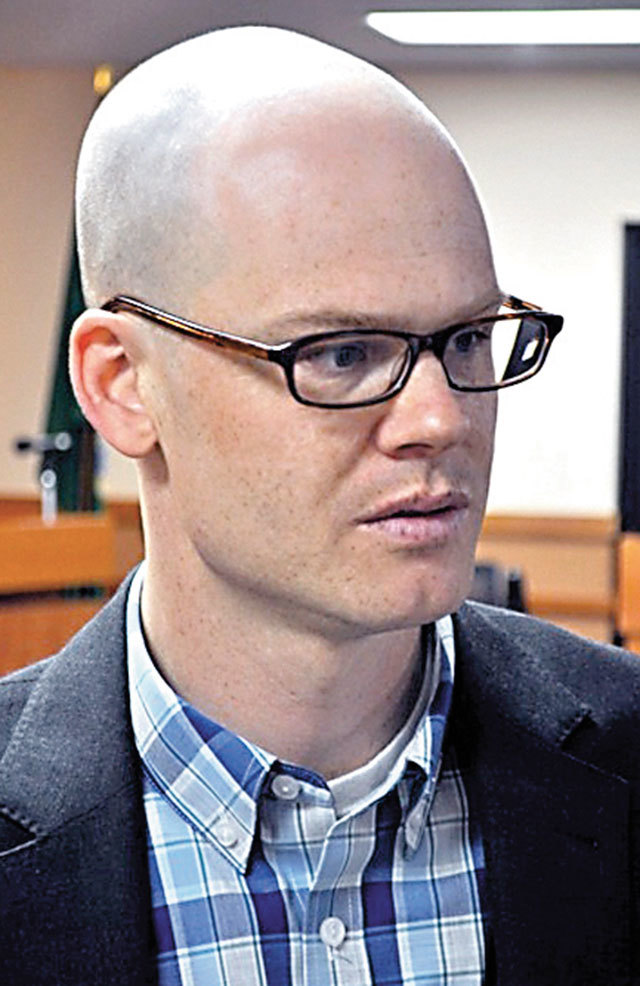PORT ANGELES — Getting rid of grandpa’s pain pills or the kids’ expired cold medicine will be safer and more convenient next year, Clallam County health officials said.
The Clallam County Board of Health has voted to create a secure medicine return program for the safe disposal of unwanted or unused prescription or over-the-counter medication.
The ordinance requires pharmaceutical companies to pay for and maintain secure kiosks in pharmacies and health care clinics where drugs can be collected and incinerated.
“It really does make pharmaceutical manufacturers responsible for the full cycle of their medications,” said Dr. Christopher Frank, Clallam County health officer.
Clallam County also will have a mail-in option for rural residents when the program is up and running in the second half of 2018.
The idea is to get highly addictive opioid pills and other medications off the streets and out of the environment.
“It’s a way to decrease experimentation of opioid use in teens, but it also decreases the risk of unintentional poisonings of children and decreases the risk of suicide,” Frank said.
Clallam County has the highest opioid-related death rate in the state.
Dr. Tom Locke, Jefferson County health officer, said he will recommend that the Jefferson County Board of Health adopt its own secure medicine return program.
Six counties in the state have passed drug take-back laws: King, Pierce, Snohomish, Kitsap, Clallam and Whatcom. Clallam County’s ordinance was modeled on the Kitsap County law.
Frank pitched the secure medicine return program to the Clallam County Board of Health last July. He described the ordinance as a “common sense” regulation.
The health board, which includes Clallam County Commissioners Mark Ozias, Randy Johnson and Bill Peach, voted unanimously to adopt the ordinance Nov. 21.
Whatcom County followed suit Dec. 5.
The Jefferson County Board of Health has heard multiple briefings on the topic in recent years.
“The thought has always been to wait until legal challenges from the pharmaceutical companies had been resolved and the logistical issues for rural counties were resolved,” Locke said in a Thursday email.
“It seems like both of these hurdles have been overcome.”
Locke said he planned to present information on secure medicine return at the next Jefferson County Board of Health meeting Thursday and make a recommendation that Jefferson County “move forward” on a drug take-back program.
In response to early ordinances adopted in King County and Alameda County, Calif, drug manufacturers established the Medicine Education and Disposal, or MED, Project.
Under the new system, MED-Project will develop a proposal for a drug take-back program in Clallam County within six months.
“We’ll review it in coordination with Kitsap County,” Frank said.
More than 80 secure drop boxes have been installed in King County since the MED-Project began there in late 2016.
Medicines in any dose can be returned to the kiosks or mail-in package distribution sites. Illicit drugs, needles and vitamins are not accepted at the collection sites.
“This ordinance is an important piece of the puzzle in preventing opioid addiction, and it creates a stable funding mechanism to make sure the program is sustainable,” Clallam County Health and Human Services Director Andy Brastad said in a news release.
Health officials say medicine thrown in the trash, poured down the drain or flushed down the toilet can harm the environment.
Septic tanks and sewer systems are not designed to treat pharmaceuticals in wastewater, Clallam County health officials said.
Before the U.S. Drug Enforcement Administration relaxed its rules for drug collection sites, law enforcement was the only avenue for secure medicine return.
Several North Olympic Peninsula law enforcement agencies have medicine drop boxes in their lobbies.
Many have sponsored annual drug take-back events in conjunction with local pharmacies such as Jim’s Pharmacy in Port Angeles.
“Jim’s and law enforcement had been doing a really great job with secure medicine returns, but they were eating those costs,” Frank said in a telephone interview.
“They were doing a community service. This is way to provide sustainable funding for these kinds of projects.”
Owners of Jim’s Pharmacy and Chinook Pharmacy in Forks have expressed interest in housing secure medicine return kiosks, as have some hospitals and clinics, Frank said.
“We anticipate that other pharmacies will also be interested in having these kiosks,” Frank said.
Early ordinances passed in King County and Alameda County, Calif., withstood legal challenges from the pharmaceutical industry, Frank has said.
The precedent for counties to adopt similar rules has been established.
“It’s been settled,” Frank said.
“It’s very clear now that this is well within the rights of counties.”
The state legislature might consider adopting a statewide secure medicine return program in the upcoming legislative session, Frank said.
A statewide program would not usurp local regulations tailored to individual counties, Frank added.
________
Reporter Rob Ollikainen can be reached at 360-452-2345, ext. 56450, or at rollikainen@peninsuladailynews.com.

